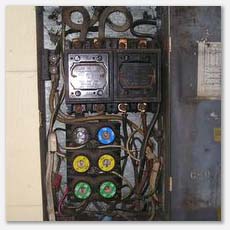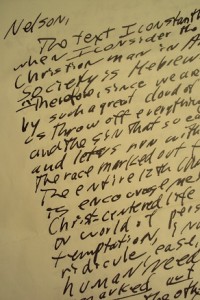Until recently at my house we were still working with an ancient fuse box and glass screw-in fuses. Since we had circuit-breakers at our last house, moving to the cottage brought an electrical learning curve. At first I couldn’t tell if a fuse was blown or good, and it was a guessing game trying to link their power with certain areas of the house. Gradually, though, the fuse box and I became friends… until last summer.
 My electric water heater would work fine for a couple of weeks, then go cold. I’d replace a couple of fuses, and it would work again until a few weeks later. One day while at the hardware store buying more fuses, I described this to the clerk. “Are you using the right number?” he said.
My electric water heater would work fine for a couple of weeks, then go cold. I’d replace a couple of fuses, and it would work again until a few weeks later. One day while at the hardware store buying more fuses, I described this to the clerk. “Are you using the right number?” he said.
“Yes,” I said, “two of them.”
“No, I mean the number on the fuse. They have different strengths. Check your fuse box. Sometimes it says.”
And sure enough, I’d been using 20’s in two holes needing 30’s, shorting on power to the water heater. After I corrected my error, all was well. If only life’s other shortages were as easy to repair: shortages of sleep, money, patience, energy, wisdom, all kinds of things.
Each of us has felt pinched in specific ways from time to time. For example, every new parent knows about sleep shortages and later learns about patience shortages when their children test them.
Nate and I had financial shortages for many years. Families in other countries find themselves short of food or medicine. People in jobs that require creativity find themselves short of ideas, and those needing physical strength in their work become short of energy.
But the worst is when we feel shorted by God, that he hasn’t come through like he said he would. We claim his promise to provide for our needs and wonder why we’re short on cash. We put him first, believing he’ll direct us, then wonder why we’re unemployed.
I’ve found it helpful not to look at the current-day shortage but rather at past provision. It’s the manna principle. God told the hungry Israelites to collect only enough for “today.” If they gathered extra, it rotted.
That’s often how we define our shortages: “I made it through today but I need to know I’ll have enough for tomorrow.”
If we apply the manna principle, we’ll focus on the first half of that sentence rather than the last. Worrying about stockpiling “extra” is wasted effort.
I remember when a grandchild asked me for some juice. She usually only drank half, so I filled her cup accordingly. As I gave it to her, she cried out, “No! All the way full!”
 Thinking she must be very thirsty, I filled it to the top and handed it to her. She said, “Thank you,” and skipped off to play. Later I found her cup. She’d drunk only half.
Thinking she must be very thirsty, I filled it to the top and handed it to her. She said, “Thank you,” and skipped off to play. Later I found her cup. She’d drunk only half.
“The eye never has enough of seeing, nor the ear its fill of hearing.” (Ecclesiastes 1:8b)



